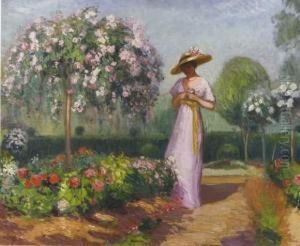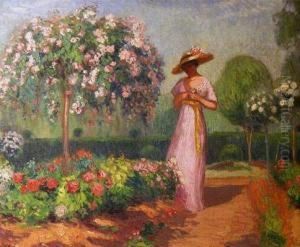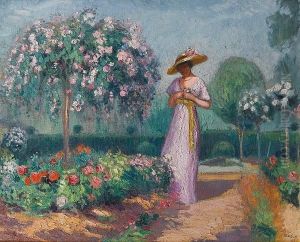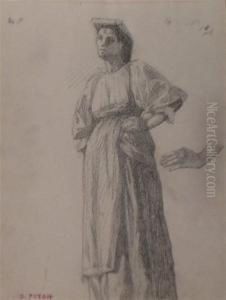Denys Puech Paintings
Denys Puech was a French sculptor born on December 3, 1854, in Gavernac, near Rodez, in the Aveyron department of southern France. He was the son of a carpenter and initially began his artistic journey by learning to carve in wood. However, his talent for sculpture in stone and marble became evident early on. Puech pursued his passion for art by moving to Paris, where he studied under renowned sculptors François Jouffroy and Alexandre Falguière at the École des Beaux-Arts. His traditional academic training there provided him with the technical skills and classical style that he would apply throughout his career.
Puech's work gained notable recognition in the 1880s and 1890s, particularly with his submissions to the Salon, an official art exhibition of the Académie des Beaux-Arts in Paris. His sculptures often featured allegorical subjects, portraits, and mythological themes, executed with a refined elegance that was characteristic of the period's taste. In 1884, he was awarded the prestigious Prix de Rome for his sculpture 'Meissonier,' which allowed him to study at the French Academy in Rome, housed in the Villa Medici, for several years. This experience further enriched his artistic language with influences from the Renaissance and classical antiquity.
Denys Puech's successful career was marked by numerous public commissions and honors. He became a sought-after portraitist among high society and political figures. His works were not only appreciated in France but also internationally, with pieces displayed in various countries. In 1900, he was awarded the Grand Prix for sculpture at the Exposition Universelle in Paris, further cementing his reputation. Puech was appointed an Officer of the Legion of Honour in 1892 and advanced to the rank of Commander by 1921.
Despite his conventional approach to sculpture, which eventually fell out of favor with the advent of modernist movements, Puech continued to work and receive commissions into his later years. He also contributed to the cultural landscape by serving as the director of the French Academy in Rome from 1921 until 1933, influencing a new generation of artists.
Towards the end of his life, Puech established a museum in Rodez to house his works and his personal collection of art, thus ensuring his legacy. He died on December 5, 1942, in Rodez, leaving behind a body of work that exemplifies the academic artistic traditions of the late 19th and early 20th centuries. Today, Denys Puech's sculptures can be seen in various museums and public spaces, preserving the memory of his contribution to French art.



